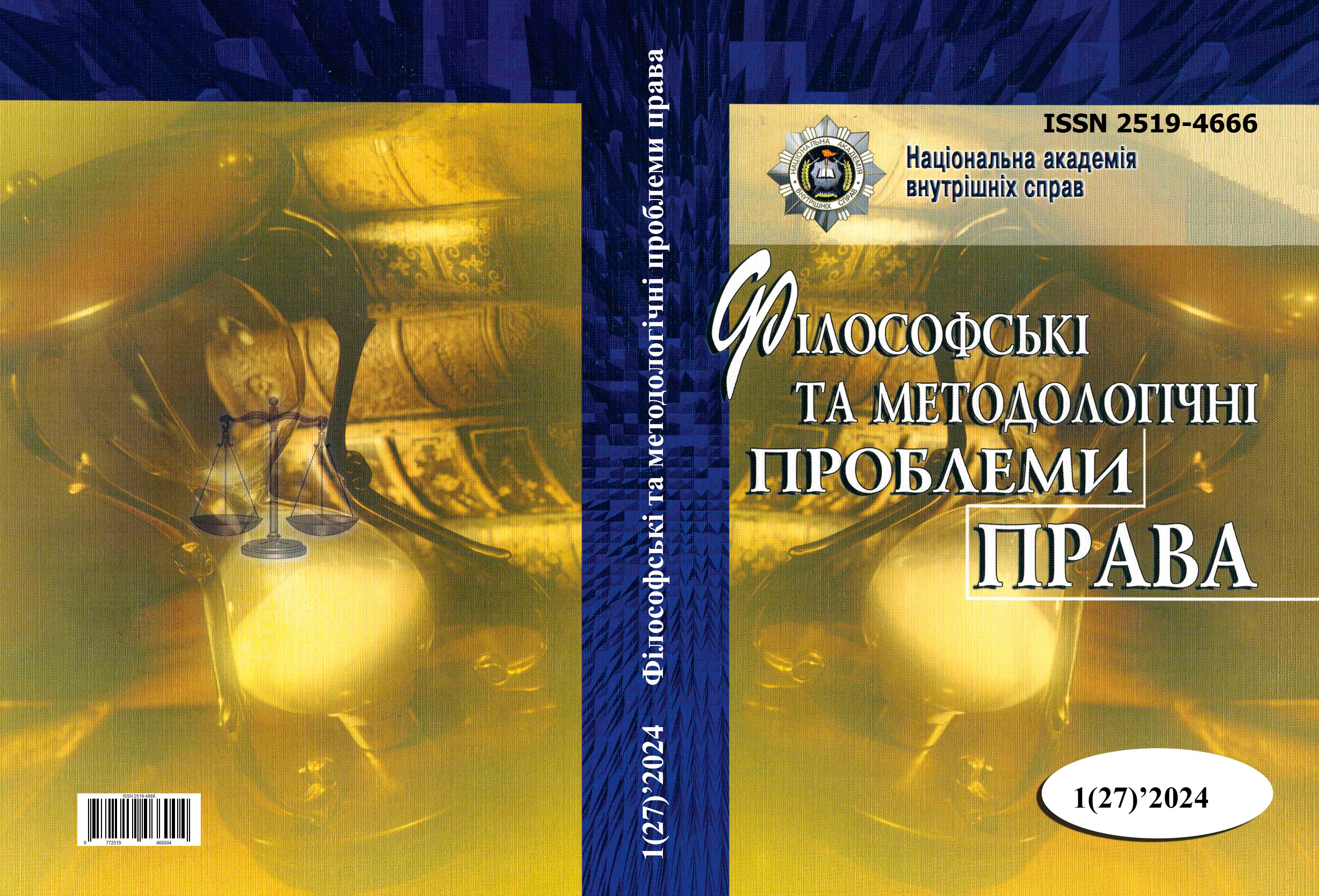Philosophical and Legal Foundation of International Law and Prospects for its Development
Abstract
Abstract. The relevance of the research is stipulated by the challenges faced by modern international law, turbulence and uncertainty provoked by the actions of one of subjects of international law which gravely violates the principles and norms of international law. The author touches upon the moment of origin of philosophical and legal views on international law, their development in the views and works of Socrates, Epicurus, Georg Wilhelm Friedrich Hegel, Hugo Grotius, and outlines the current trends in philosophical and legal thought that can be traced in current universal international legal instruments and the prospects for transforming the philosophical and legal foundation of international law. The author provides an answer to the question of the effectiveness of international law in the future, taking into account current tendencies. The purpose of the research is to highlight and analyze the philosophical and legal foundation of the science of international law, to identify the patterns and problems facing the modern philosophical and legal foundation, and to characterize the prospects for the development of the philosophical thought of international law. The material presented herein is of a certain scientific novelty, since the subject of philosophical and legal comprehension of modern international law is rarely studied, despite its exceptional importance. The practical significance of the research lies in the fact that the author has proposed a new vision of the main role of international law in the context of human development.
Keywords: international law; philosophy; international security; human rights; values; justice.
Downloads
References
Aoiz, J., & Boeri, M.D. (2023). Theory and Practice in Epicurean Political Philosophy: Security, Justice and Tranquility. London: Bloomsbury Publishing. doi: 10.5040/9781350346574.
Arajärvi, N. (2021). The Core Requirements of the International Rule of Law in the Practice of States. Hague Journal on the Rule of Law, 13(1), 173-193. doi: 10.1007/s40803-021-00152-8.
Aristotle. (2020). The Nicomachean Ethics. Oxford: Oxford University Press. doi: 10.1093/actrade/9780199213610.book.1.
Bradley, C.A. (Ed.). (2016). Custom's Future: International Law in a Changing World. Cambridge: Cambridge University Press. doi: 10.1017/CBO9781316014264.
Bryson, S. (2020). The Occurrence of Rocky Habitable Zone Planets Around Solar-Like Stars from Kepler Data. The Astronomical Journal,161(1). doi: 10.3847/1538-3881/abc418.
Buyuk, M.E. (2022). The Development of the Theory of Sovereignty and the Modern Law of Nations from Machiavelli to Grotius. Istanbul Hukuk Mecmuasi, 80(1), 299-356. doi: 10.26650/mecmua.2022.80.1.0010.
Carmen, P.E. (2021). Law Beyond the State: Dynamic Coordination, State Consent, and Binding International Law. Oxford: Oxford University Press. doi: 10.1093/oso/9780197543894.001.0001.
Carty, A. (2017). Philosophy of International Law. Edinburgh: Edinburgh University Press. doi: 10.1515/9780748675524.
Delaplaine. (2023). The Delaplaine Honoré de Balzac. His Essential Quotations.
Ertl, W. (2020). The Guarantee of Perpetual Peace (Elements in the Philosophy of Immanuel Kant). Cambridge: Cambridge University Press. doi: 10.1017/9781108529785.
Grotius, H. (2016). On the Law of War and Peace. Cambridge: Cambridge University Press. doi: 10.1017/CBO9781139031233.
Hehel, H. (2023). The science of logic. Encyclopedia of philosophical sciences. Small logic. Kyiv: Lira-K.
Houlgate, S. (2016). Right and Trust in Hegel’s Philosophy of Right. Hegel Bulletin, 37(1), 104-116. doi: 10.1017/hgl.2016.5
Kant, I. (2016). Perpetual Peace: a Philosophical Essay. London: Project Gutenberg.
Kostytskyi, M., & Kushakova-Kostytska, N. (2018). Epistemology, methodology and axiology of law. Philosophical and methodological problems of law, 1-2(15-16), 11-24. Retrieved from https://philosophy.naiau.kiev.ua/index.php/philosophy/article/download/1003/1016.
Lefkowitz, D. (2020). Philosophy and International Law: A Critical Introduction. Cambridge: Cambridge University Press. doi: 10.1017/9781316481653.
Murphy, L. (2017). Law Beyond the State: Some Philosophical Questions. European Journal of International Law, 28(1), 203-232. doi: 10.1093/ejil/chx004
Odyntsova, H., & Odyntsova, Yu. (Eds.). (2021). Linguistic aphorisms and figurative expressions. Ternopil: Navc. kn. - Bohdan.
Platon. (2021). Republic. Кyiv: Apriori.
Raz, J. (2019). The Future of State Sovereignty. S. Wojciech, S. Michael, W. Kevin (Eds). Legitimacy: The State and Beyond. Oxford: Oxford Academic. doi: 10.1093/oso/9780198825265.003.0005.
Talmon, S. (2015). Determining Customary International Law: The ICJ’s Methodology between Induction, Deduction and Assertion. European Journal of International Law, 26(2), 417-443. doi: 10.1093/ejil/chv020.
Tasioulas, J. (2013). Human Rights, Legitimacy, and International Law. The American Journal of Jurisprudence, 58(1), 1-25. doi: 10.1093/ajj/aut001.
Tasioulas, J. (2016). Custom, Jus Cogens, and Human Rights. Custom’s Future: International Law in a Changing World (pp. 95-116). C. Bradley (Ed.). Cambridge University Press. doi: 10.1017/CBO9781316014264.005.
Tasioulas, J. (2020). International Law. Oxford: Oxford University Press. doi: 10.1017/9781316104439.021.
Tooze, A., & Shapiro, I. (2018). Charter of the North Atlantic Treaty Organization. Together with Scholarly Commentaries and Essential Historical Documents. Yale University Press. doi: doi.org/10.2307/j.ctvvndts.
Abstract views: 55 PDF Downloads: 68
Copyright (c) 2024 Philosophical and Methodological Problems of Law

This work is licensed under a Creative Commons Attribution-NonCommercial-NoDerivatives 4.0 International License.
- Authors reserve the right to authorship of their own work and transfer to the magazine the right of the first publication of this work under the terms of the Creative Commons Attribution License, which allows other persons to freely distribute published work with mandatory reference to authors of the original work and the first publication of an article in this magazine.
- Authors have the right to enter into separate additional agreements on non-exclusive dissemination of the work in the form in which it was published in the journal (for example, to post an article in the institution's repository or to publish as part of a monograph), provided that the link to the first publication of the work in this journal is maintained.
- The journal's policy allows and encourages the posting of articles by authors on the Internet (for example, in electronic storehouses of institutions or on personal websites), both before the submission of this manuscript to the editorial office and during its editorial processing, as this contributes to the creation of a productive scientific discussion and positively affects the efficiency and dynamics of citing the published work.




